Billed as Theater J’s “largest production ever”—with a cast of nine and a trio of multifaceted musicians, some of whom double as actors—Hester Street is a passionate musical drama about immigration more than a century ago.
The tale—first told in a novel that was widely ignored, then in a low-budget film that became a classic—is premiering at Theater J, where it plays through April 21.
I asked Sharyn Rothstein, the accomplished playwright who created this stage adaptation, to join me in a conversation on Zoom, and explain why a play about migrants in the 1890s was so relevant in 2024.
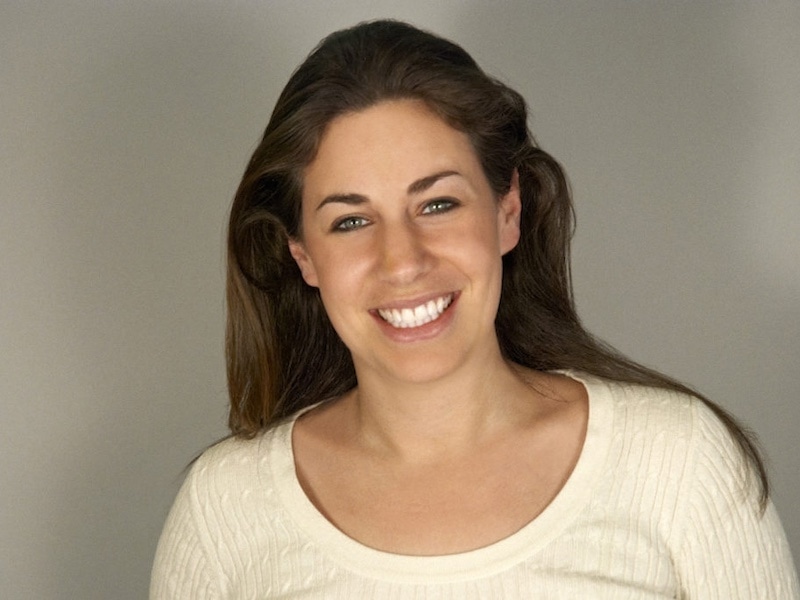
“That’s because the subject is universal,” she replied, adding that there are especially strong political overtones today.
“I hope this play will serve as an answer to those who claim that ‘immigrants are poisoning the blood of Americans.’ We, the descendants of immigrants, are the Americans,” she said.
“This story belongs on the contemporary stage.”
The new musical Hester Street is based primarily on the 1975 black-and-white film of the same name written and directed by Joan Micklin Silver—who herself adapted it from an earlier work, a slim novel by Abraham Cahan called Yekl: a Tale of the New York Ghetto, originally published in 1896.
Although written in flawless English, the novel was panned by critics and readers alike, largely because its subject—those unwashed “greenhorns” from Eastern Europe—was of no interest to educated American readers at the time. (Cahan, founder of The Jewish Daily Forward—now known as The Forward—was fluent in Yiddish, Russian, and English.)
While Cahan’s book focused on Yekl (the husband who rejects his newly arrived wife, Gitl, because she is not a fun-loving “Americaner”), Silver’s film focused on Gitl.
Rothstein’s stage play is a combination of the two, with a lot added. “I chose to bring both stories together, giving equal power to Yekl, who is now Jake, and Gitl, who is still Gitl. I wanted to take a deeper look at all the characters,” she said.
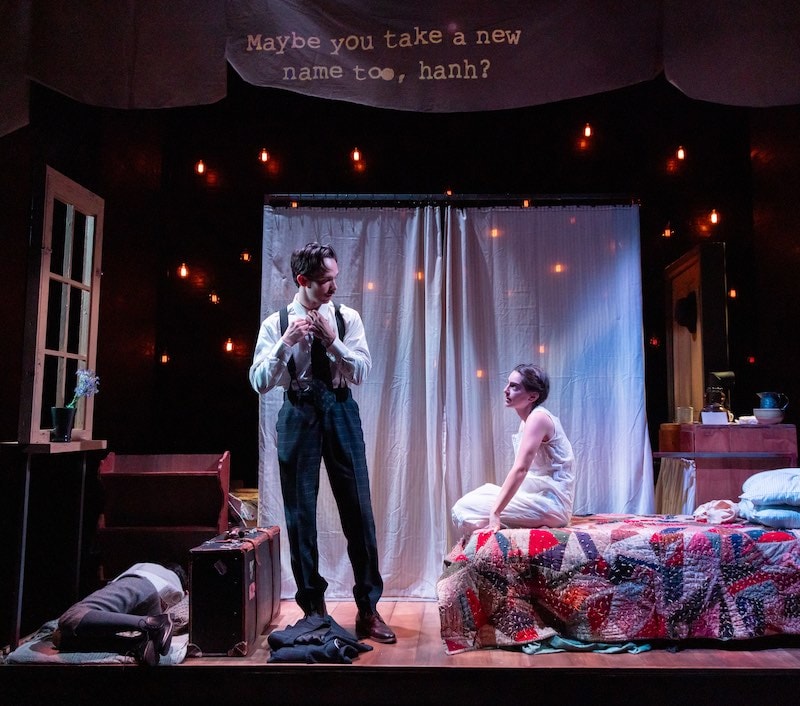
The original music, written by Joel Waggoner, adds another dimension to the story. “I saw it as an opportunity to introduce a sense of today,” she explained, adding, “The one thing I was sure of is that I did not want a nostalgia piece!”
She describes the music as “Brechtian,” with three musicians playing piano, accordion, violin, a little clarinet, and a brassy trombone.
“It’s not a traditional musical but a play with music,” she added. “We’ve stripped it down to the basics, so it’s a story about immigrants and assimilation, which invariably involves loss.”
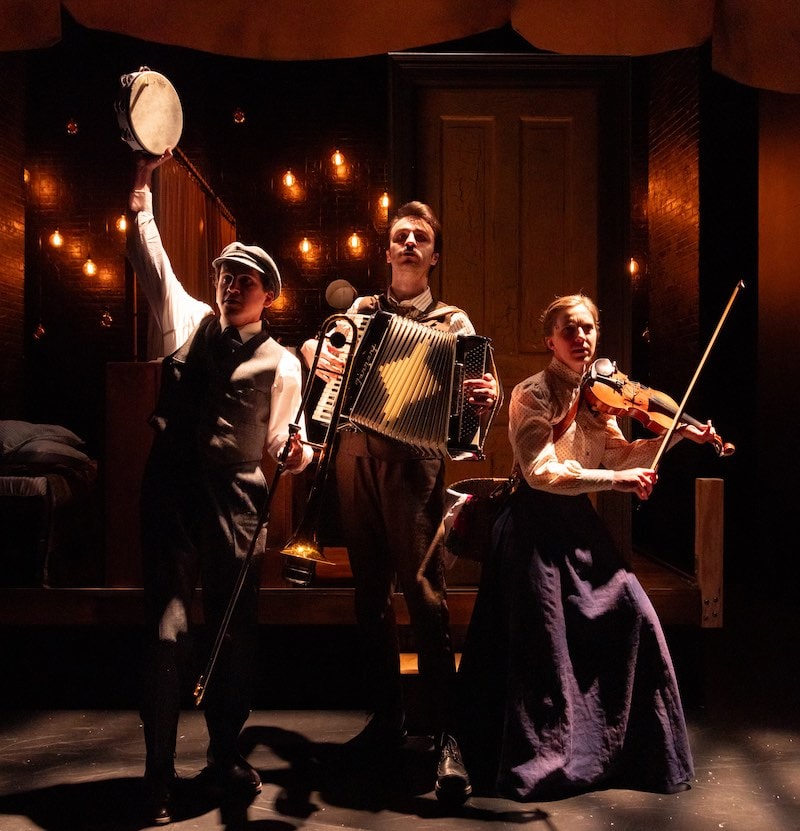
Rothstein started working on Hester Street seven years ago, but the production, like many others, was upended by the pandemic. Luckily, Joan Micklin Silver was still alive at the time, and Rothstein was able to meet her.
“It was right after the 2016 election. I went to see her at her Manhattan apartment and sat at her kitchen table, talking about how I would adapt the film. And she gave the project her blessing. It was a very humbling experience,” Rothstein said.
“Silver was a pioneer,” she added. “She created a career for herself as a screenwriter and director at a time when antisemitism and misogyny were both rampant. Women directors, especially, were virtually unknown.
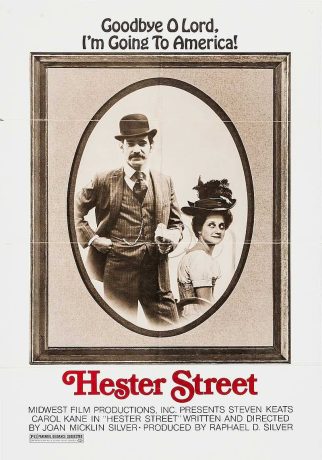
“She had a tiny budget. For example, they could afford only one horse and wagon, so they filmed the same horse over and over, coming and going, in order to produce what appeared to be a street full of horses and wagons.”
Silver’s husband, Raphael D. Silver, was her producer. “He was tremendously supportive,” Rothstein said. “Joan and her family came to our first reading.
“It’s heartbreaking that she did not live to see the premiere at Theater J. But I hope we’ve done her proud.”
It’s easy to understand why Hester Street resonates so strongly with Rothstein. Her great-grandparents—like Gitl and Jake—arrived in New York at the turn of the last century.
Along with other migrants, then and now, they began as street peddlers on the Lower East Side, then the poorest part of New York. The next generation—her maternal grandparents—moved to Queens, where they lived in Flushing, just opposite the Orthodox Synagogue, which they attended.
Her grandfather had a piano-moving business, using a horse and buggy to deliver the second-hand uprights that were a staple of immigrant life. Her grandmother worked at a lingerie store on Orchard Street.
“Like all Americans, we have a tendency to gloss over the details of how we got here. We forget how real the struggles of our immigrant grandparents and great-grandparents were. They had to fight against fierce antisemitism.”
Many were forced to leave the homes they loved, threatened by persecution and pogroms. Nobody talked about “asylum” or “illegals.” But the words of Emma Lazarus, inscribed on the Statue of Liberty, echoed the reality that these were “huddled masses yearning to breathe free.”
Like the children of other immigrants, Rothstein’s parents met at what was then a local college—New York University, known at the time as a commuter school—and moved shortly afterward to northern Connecticut. She grew up “with a smattering of Yiddish” and a collection of family stories.
As a result, when she was asked to write the stage adaptation of Hester Street, she felt “destined” to do it. It was, as they say, bashert (Yiddish for fate).
To date, Rothstein has written nearly a dozen plays. “I’m very lucky, in that at least half of them have been produced so far,” she said, adding that the American theater is struggling. “There are fewer theaters, fewer resources.”
Why Theater J? I asked.
“It was a natural choice,” she laughed. “Hester Street is a deeply Jewish show. It belongs here. There’s a lot of Yiddish in the play, so we wanted an audience that had some familiarity with the language.”
Happily, knowing Yiddish is not a requirement. Theater J uses subtitles, projected onto a back screen, for those (like me) who do not know the language at all.
“The actors have done a wonderful job learning Yiddish, working with a dialect coach as well as a Yiddish advisor,” she added.
Even more important, Theater J was willing to take risks.
And why DC?
“Washington,” she replied, “is a great theater town, blessed with plenty of local talent, and smart audiences that appreciate what they see and actually attend the shows.”
(This is her third play to be produced in the DC Metro area. Her previous show, Right to Be Forgotten, had its world premiere at Arena in 2019. Her next play will open at Round House in the spring of 2025.)
Today, Rothstein lives in Brooklyn, with her husband—who is in the entertainment industry—and two children, who are 10 and 12. She works at home, where she is allowed to write in her daughter’s room when the latter is at school.
Like many of those writing for the stage nowadays, she is a prolific television writer and producer. Shows include the current Orphan Black on AMC and the longtime legal drama Suits on USA. She teaches writing at NYU.
Writing runs in the family. Her mother, Marilyn Simon Rothstein, wrote advertising copy and ran her own agency in Avon, Connecticut. Now a novelist, she is about to publish her fourth book.
I asked the playwright for a final thought on Hester Street. She had several.
“It’s very easy to forget that we were once refugees. I hope audiences are moved, and uplifted, by this reminder of people past.
“And the music will blow you away.”
Final thought? “Bring your children!”
Running Time: Approximately two hours, including one 15-minute intermission.
Hester Street plays through April 21, 2024, presented by Theater J at the Aaron & Cecile Goldman Theater in the Edlavitch DC Jewish Community Center, 1529 16th Street NW, Washington, DC. Purchase tickets ($50–$70, with member and military discounts available) online, by calling the ticket office at 202-777-3210, or by email ([email protected]).
The program for Hester Street is online here.
COVID Safety: Masks are required for Thursday evening and Saturday matinee performances. For more information, visit Theater J’s COVID Safety Guidelines.
Hester Street
World premiere
Written by Sharyn Rothstein
Original music and songs by Joel Waggoner
Based on the film by Joan Micklin Silver
Directed by Oliver Butler
Produced in association with Michael Rabinowitz and Ira Deutchman
CAST
Joey: Katie Angell
Rabbi and Others/Instrumentalist: Jason Cohen
Mamie: Eden Epstein
Jake: Jake Horowitz
Gitl: Sara Kapner
Joey Understudy: Alexandra Moore
Joe Peltner: Morgan Morse
Bernstein: Michael Perrie Jr.
Mrs. Kavarsky and Others: Dani Stoller
Rabbi’s Wife and Others/Instrumentalist: Lauren Jeanne Thomas
CREATIVE TEAM
Director: Oliver Butler
Associate Director & Choreographer: Nikki Mirza
Scenic Designer: Wilson Chin
Costume Designer: Frank Labovitz
Lighting Designer: Colin K. Bills
Projection Designer: Patrick W. Lord
Sound Designer: Justin Schmitz
Props Designer: Jason Dearing
Casting: Eisenberg Casting, Daryl Eisenberg, CSA
Casting Assistant: Chelsi Kern
Production Stage Manager: Anthony O. Bullock
Assistant Stage Manager: Rebecca Talisman
Assistant Stage Manager: Delaney Dunster
A personal note
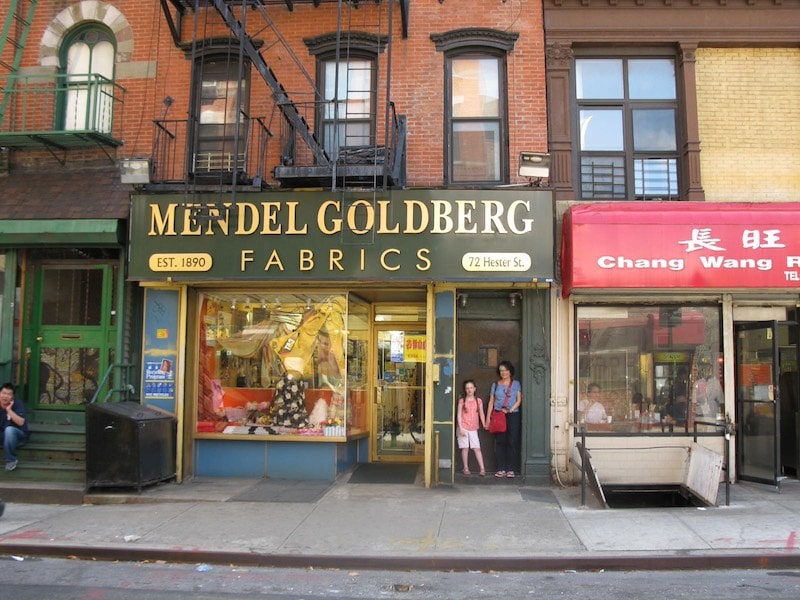
My grandparents, Nathan and Miriam Marans Kaplan, lived in a tenement on Hester Street, near the fictional home of Jake and Gitl, and not far from the actual home of the playwright’s great-grandparents.
My relatives owned a candy store on East Broadway, next to the Daily Forward, where my grandfather used to hang out with the editor, Abraham Cahan, a fellow Litvak (from Lithuania), discussing Shakespeare—which was frequently performed in Yiddish on Second Avenue—socialism, and the decline in Russian literature.
Although dismissed as a refugee himself, Cahan was subsequently “discovered” and promoted into the pantheon of great American novelists of the 19th century. By the time I arrived at college, in the mid-1950s, Yekl was required reading in American Literature classes at many universities. —R.B.





Theater J’s production of Hester Street is such a timely choice. It is a pleasure to learn so much about Sharyn Rothstein’s life and her deep connection to the material. At a time when immigrants are being demonized and antisemitism is on the rise, Rothstein’s point is well taken. “We, the descendants of immigrants, are the Americans.”